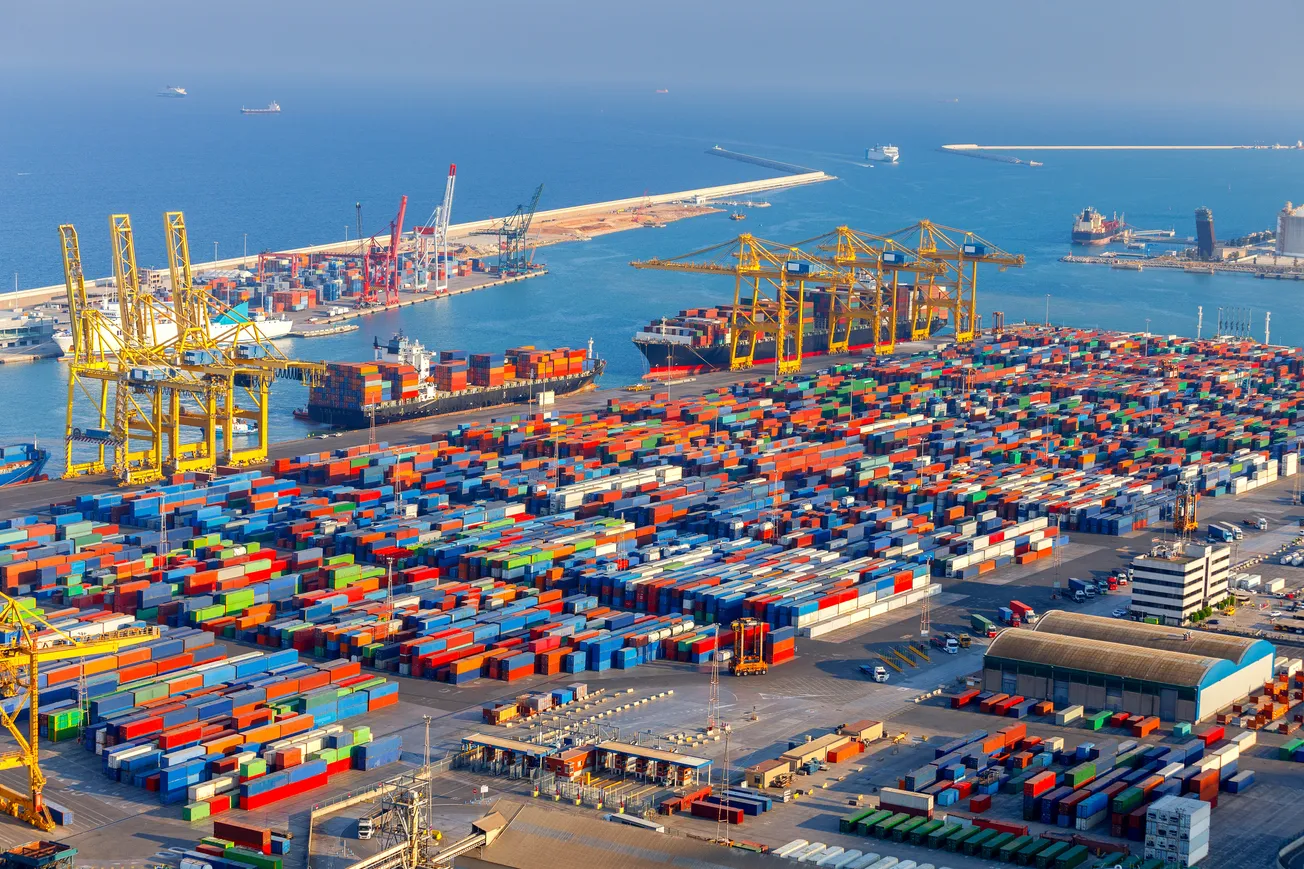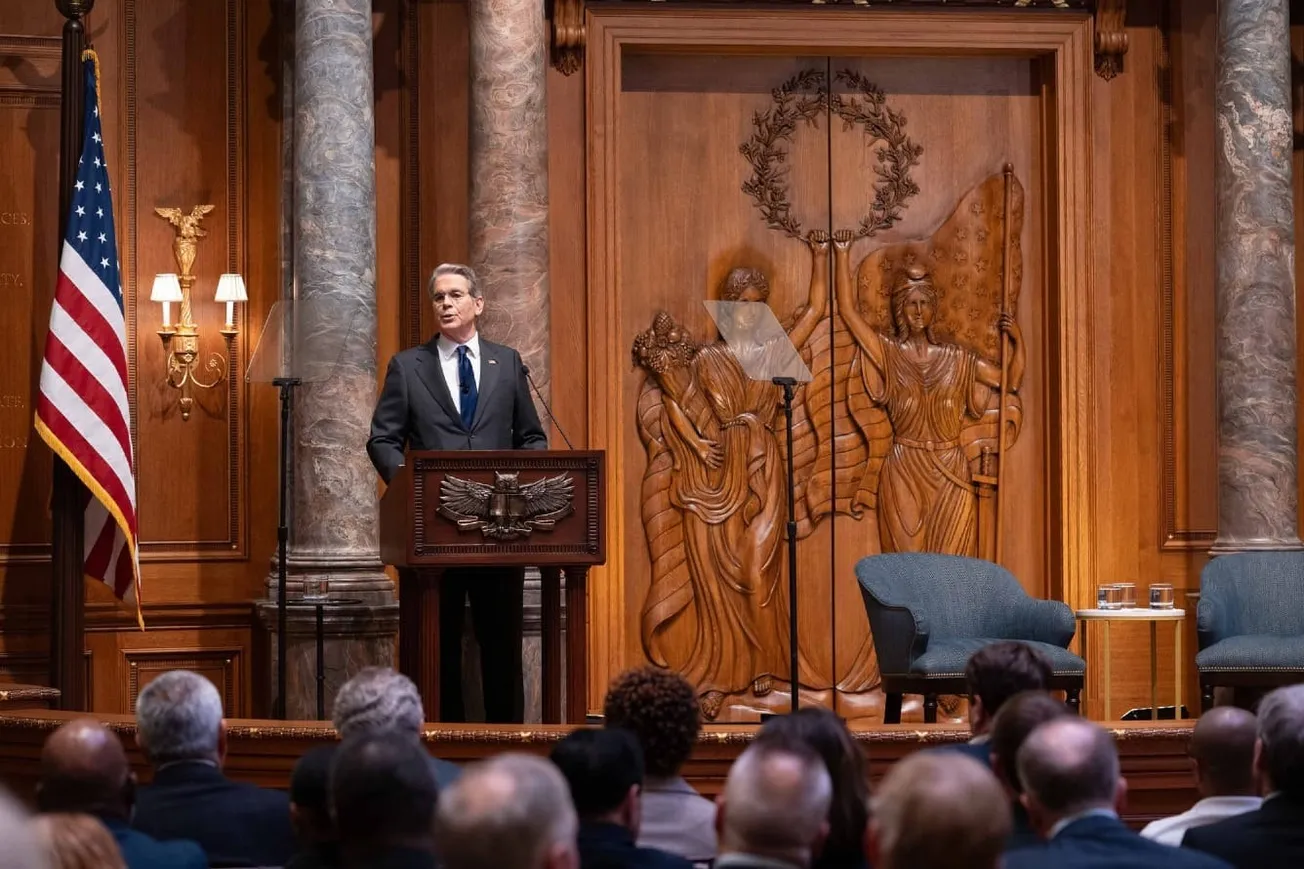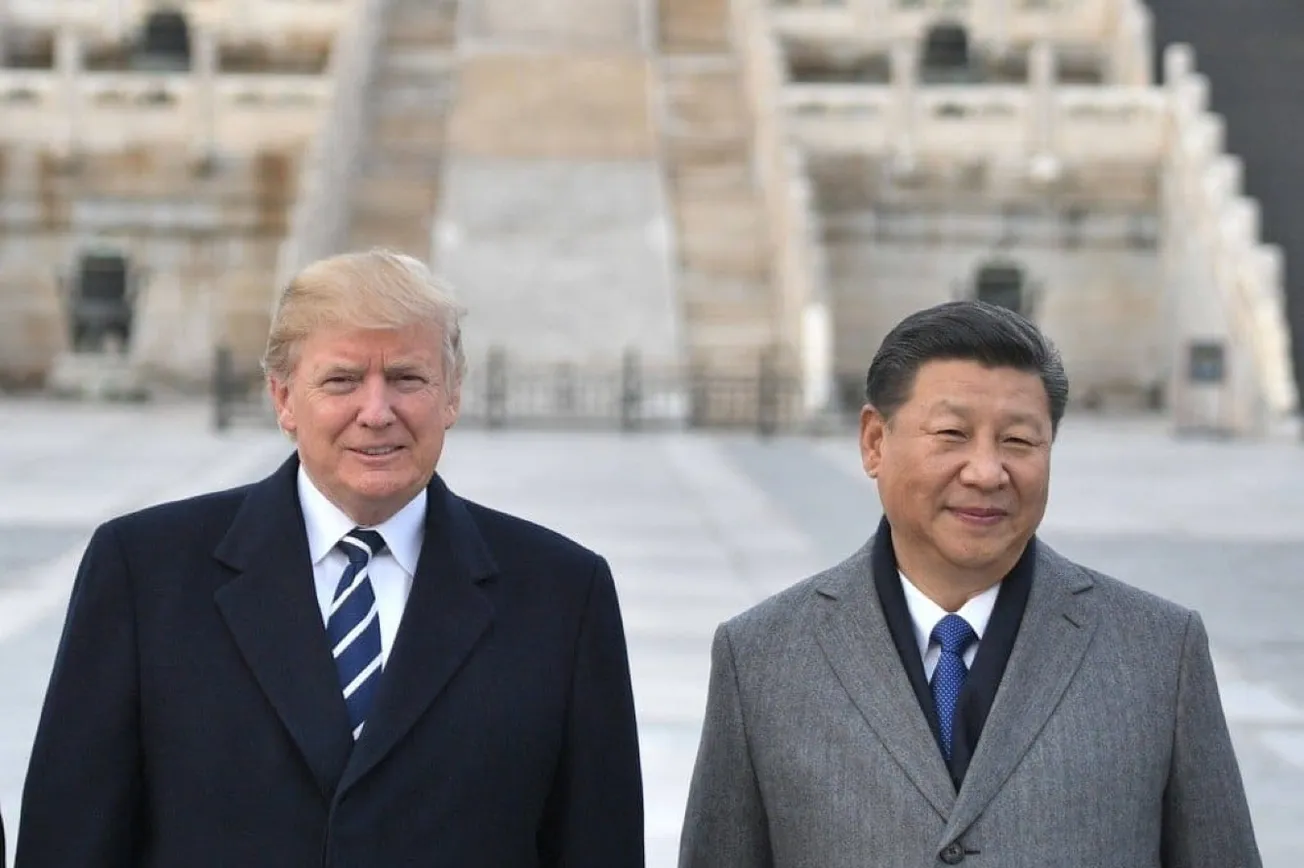It's a cardinal rule for many, if not most, economists that tariffs are at best a misguided strategy for reviving a nation's economy, at worst a strategy that will backfire by hiking inflation and killing jobs. But don't tell Americans that. Half of those in the most recent I&I/TIPP Poll support imposing new tariffs on other nations' goods.
President Trump came into office promising to impose a hefty 25% tariff on goods from Mexico and Canada, and an additional 10% tariff on China, citing those countries allowing “mass numbers of people and fentanyl” to cross their borders into the U.S.
Initially, Trump said those tariffs would go into effect immediately, but since changed their implementation date until Feb. 1 — presumably to give the three countries an opportunity to forge a response. The clock's ticking.
In January's national online I&I/TIPP Poll, 1,424 adults were asked the following question (one of three related to tariffs): "Do you support or oppose the U.S. placing new tariffs on goods imported from other countries?" The poll's margin of error is +/-2.6 percentage points.
A strong plurality of 49% answered that they supported tariffs either "strongly" (20%) or "somewhat" (29%), while 34% responded that they opposed the move "somewhat" (16%) or "strongly" (18%). Uncertainty was fairly high, with 17% saying "not sure."
It might not be too surprising that, as is often the norm, political affiliation helps define the responses.
Only 34% of Democrats, for instance, support tariffs, while a majority of 51% oppose them. Republicans, on the other hand, support tariffs by a significantly large 73% margin, versus opposition of only 15%. Independents are neatly split, at 41% support and 39% oppose.
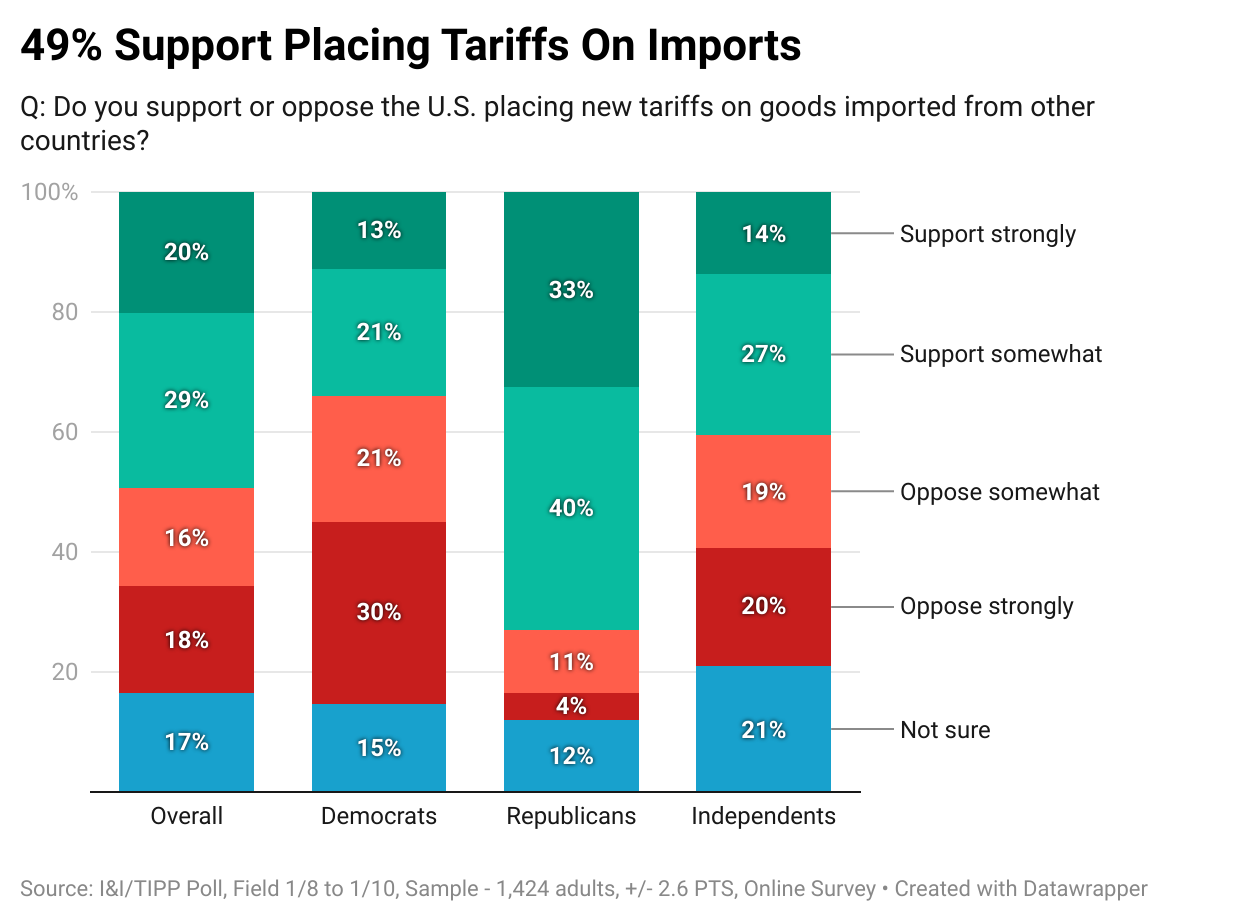
As mentioned, that wasn't the only question on tariffs. The second was: "To what extent do you agree or disagree with the following statement: Imposing tariffs will incentivize foreign companies to manufacture within the United States."
And again, 48% agreed either "strongly" (18%) or "somewhat" (30%), while 30% disagreed either strongly (13%) or somewhat (17%).
Predictably, this question also divided respondents by political party, given that the long-moribund issue of tariffs on foreign goods was revived only in recent years by President Donald Trump.
However, while 38% of Democrats saw tariffs "incentivizing" foreign companies to make things here, only 42% disagreed with that. For Republicans, the tally was 65% agree to 16% disagree, and for independent voters 44% agree to 33% disagree, leaning more toward the GOP.
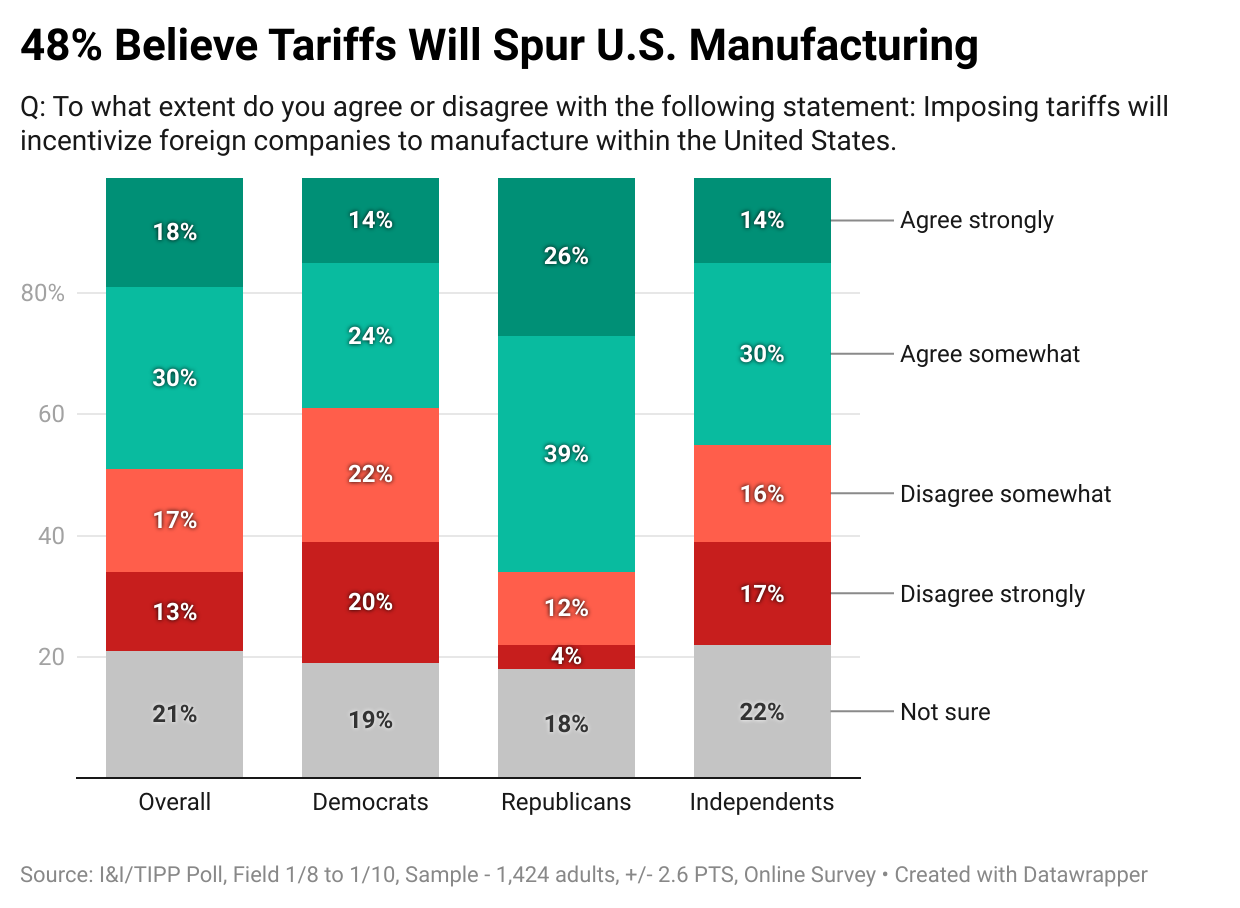
One final big question about tariffs: "Do you think raising tariffs to imports from other countries will do more to protect American jobs and strengthen the U.S. economy, do more to raise consumer costs and harm the U.S. economy, or will it not have much impact either way on the U.S. economy?"
Of all those responding, 34% said tariffs would "protect American jobs and strengthen the U.S. economy," while 36% said it would "raise consumer costs and harm the economy," and 9% said "it will not have much impact either way." Again, a large 21% of all those who answered the polls said they were "not sure."
Again, it wouldn't be a poll if it didn't include the widening political differences among the parties.
In this case, 21% of the Democrats said it would "strengthen" the U.S. economy, and 51% thought it would "harm" it, with 11% saying it wouldn't have much impact either way.
Of Republicans, 53% said it would strengthen, 21% said it would harm, and 7% said not much impact. Independents broke 26% strengthen, 39% harm and 9% no impact.
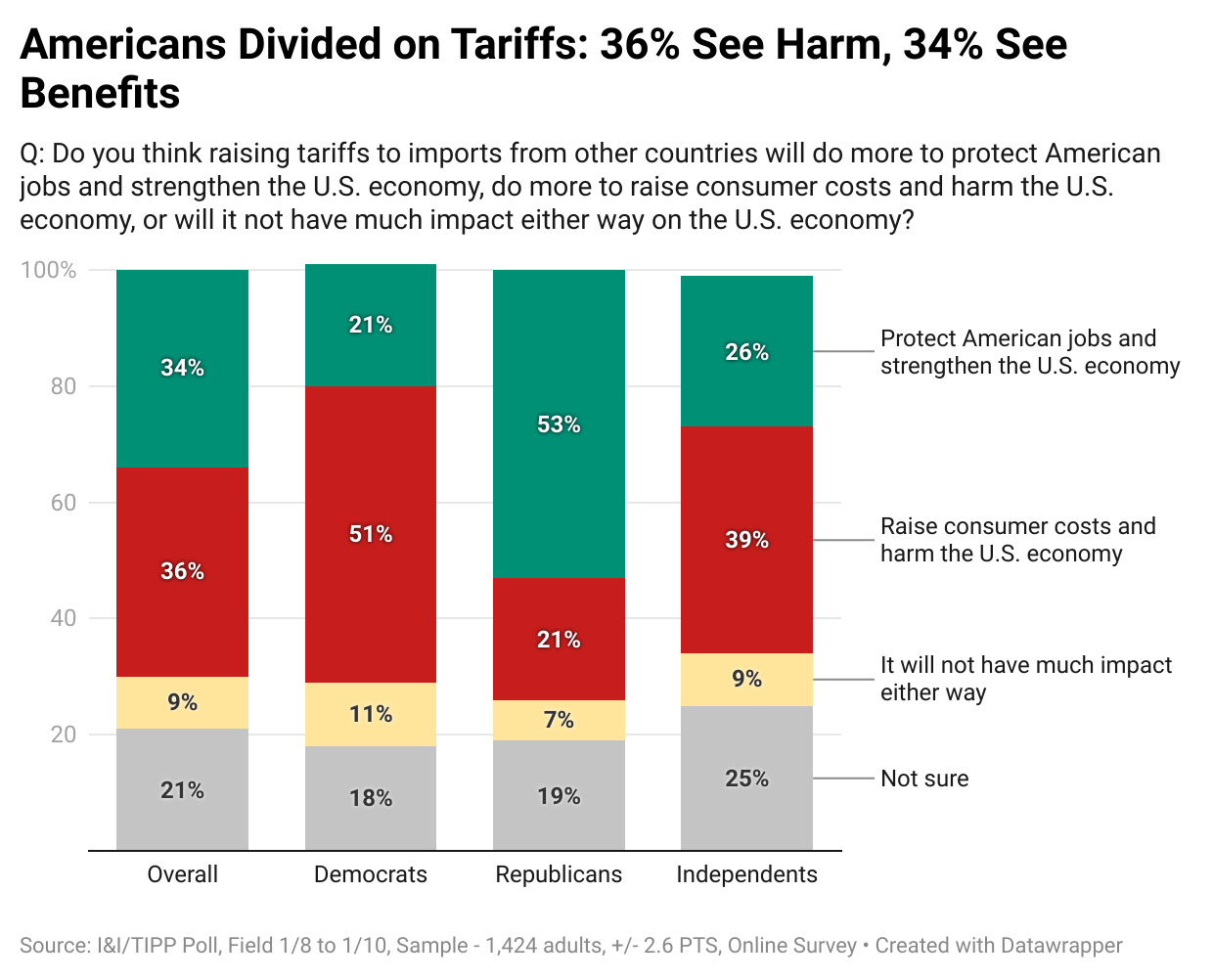
So are tariffs purely a Trump phenomenon? Or have we reached a crossroads in how Americans view free trade vs. protected trade?
It's clear that tariffs resonate with a large number of Americans. Trump has in the past used tariffs as a negotiating cudgel to win concessions from stubborn U.S. trade partners. The massive U.S. market for imports was $3.86 trillion in 2023. So, yes, it's a very big cudgel.
Trump entered office last week, as noted, threatening Mexico, Canada and China with tariffs. He added one more to the list over the weekend: Colombia, for refusing to let a U.S. plane holding Colombian deportees land. Trump immediately slapped a 25% tariff on the country.
While tariffs always create a huge debate, the truth is we already have tariffs on all sorts of goods.
As The Federalist recently explained, "anything that doesn’t come from the 20 countries we have trade treaties with. America has a trade-weighted average import tariff rate of 2.0% on industrial goods. With half of all America’s imported industrial goods entering duty-free, many goods face tariff rates above 2%."
As for this being a Trump-only issue, it isn't. Democrats have in the past embraced tariffs and other trade barriers to keep foreign goods out. As an example, Trump's tariffs on Chinese goods, imposed during his 2017-2020 first administration, remained untouched under President Biden.
Still, the economic argument against broad-based tariffs is strong: Tariffs, the argument goes, inevitably distort the free market, raise costs to consumers and punish low-cost producers.
As the Committee to Unleash Prosperity recently wrote: "Tariffs are simply an excise tax on international trade. They dampen prosperity."
The president has also mulled increasing tariffs across the board to help pay for tax reform, made possible by a new "External Revenue Service" to collect the money.
However, according to the Washington Post, citing inside sources, "rather than apply tariffs to all imports, the current discussions center on imposing them only on certain sectors deemed critical to national or economic security."
And so far, this is what Trump has done. He's used tariffs mostly as a negotiating tool on largely non-economic issues, whether with China, the European Union, Russia, Canada, Mexico, or any number of other recalcitrant partners in talks with the U.S..
Even so, businesses in other countries are already worried about the hit they'll take, after Trump's remarks last week to the Word Economic Forum in Davos, Switzerland:
“Come make your product in America,” Trump told the conference via TV hookup, vowing low taxes for all who do so. “But if you don’t make your product in America – which is your prerogative – then, very simply, you will have to pay a tariff."
Clearly, Trump sees tariffs as a way to rebuild America's ailing industrial heartland, which suffered a steep decline after the NAFTA in 1994 and China's admission to the World Trade Organization, with special trade privileges, in 2001.
Remember, too, that Trump won solid and broad support in the seven major swing states that together make up much of America's troubled industrial heartland. And there, tariffs are seen as an economic lifesaver, not an anvil.
This same sentiment is largely reflected January's I&I/TIPP Poll. It shows half of all Americans believe that tariffs will encourage foreign companies to make things here, not there.
But whether Trump broadens out his tariff approach to all goods, or tries to entirely replace the income tax with tariffs, as he has hinted he might do, one thing's clear: It would find solid support among average Americans
I&I/TIPP publishes timely, unique, and informative data each month on topics of public interest. TIPP’s reputation for polling excellence comes from being the most accurate pollster for the past six presidential elections.
Terry Jones is an editor of Issues & Insights. His four decades of journalism experience include serving as national issues editor, economics editor, and editorial page editor for Investor’s Business Daily.
TIPP Picks
Selected articles from tippinsights.com And More
Trump Administration
1. Did Trump Halt Aid To Ukraine? — Larry C. Johnson, The Ron Paul Institute for Peace and Prosperity
2. Trump Was Right To Yank Security Clearances of the 51 ‘Spies Who Lie’ — Deroy Murdock, The Daily Signal
3. Thunder and Blunder on Day One — David Stockman, The Ron Paul Institute for Peace and Prosperity
4. Affordable Housing – How Donald Trump Could Accomplish More Than Jimmy Carter — Donna Jackson & Ben Lieberman, CFACT
5. How Education System Sacrifices Our Kids to the Detriment of Society, What Trump Can Do About It — Karen Hiltz, The Daily Signal
6. Trump Tells LA Mayor ‘I Know My People’ As He Slams Her For Slow Fire Cleanup — Hailey Gomez, DCNF
Global Affairs
7. Another Government Agency Now Says COVID Likely Leaked From Lab: REPORT — Emily Kopp, DCNF
8. China Poses A Severe Threat In Panama And Leaves The US With No Choice — Martin Arostegui, The American Spectator
9. Why Trump Threatens Davos — Victor Davis Hanson, The Daily Signal
10. Who’s Even Gloomier About Trump’s Big Win Than The Dems? ‘Global Leaders’ At Davos — Editorial Board, Issues & Insights
11. Europe Shrugged—Now Irrelevant — Editorial Board, TIPP Insights
12. TikTok And The Freedom Of Speech — Andrew P. Napolitano, The Ron Paul Institute for Peace and Prosperity
13. Saved From The Terror Of TikTok — Eric Margolis, The Ron Paul Institute for Peace and Prosperity
14. WHO Begs For Money Online After Trump Announces Withdrawal — Emily Kopp, DCNF
15. Why the World Is Giving Up On Birthright Citizenship — Ryan McMaken, Mises Wire
Politics
16. The Left’s Sin Is of Omission and Lost Opportunity — Victor Davis Hanson, The Daily Signal
17. Who’s Even Gloomier About Trump’s Big Win Than The Dems? ‘Global Leaders’ At Davos — Editorial Board, Issues & Insights
18. Stephen A. Smith Says He Feels Like A ‘Damn Fool’ For Voting For Kamala Harris — John Oyewale, DCNF
19. JD Vance Gives Economics Lesson For CBS Host Trying Gotcha Question On Inflation — Hailey Gomez, DCNF
20. The Cold Civil War Is Over. We Won — Josh Hammer, The Daily Signal
21. How the US Became So Dysfunctional, Oligarchic, and Corrupt — Finn Andreen, Mises Wire
Energy/Economy
22. Free Our Energy Sector From Crippling Regulations And Inflationary Spending On So-Called “Green Energy — John R. Hays, Jr., CFACT
23. Mine, Baby, Mine! — Paul Driessen, CFACT
24. The Difference Between The Market And The Bureaucracy — Murray N. Rothbard, Mises Wire
25. The Alarming Rise Of Stakeholder Capitalism: Andrew Puzder Exposes The Threat — Rob Bluey, The Daily Signal
26. Cracking Down On Illegal Immigration Would Raise Wages For Lower-Income Americans — Alexander Frei, The Daily Signal
27. Battleground Wisconsin Set For Referendum On Enshrining Voter ID In State Constitution — Fred Lucas, The Daily Signal

